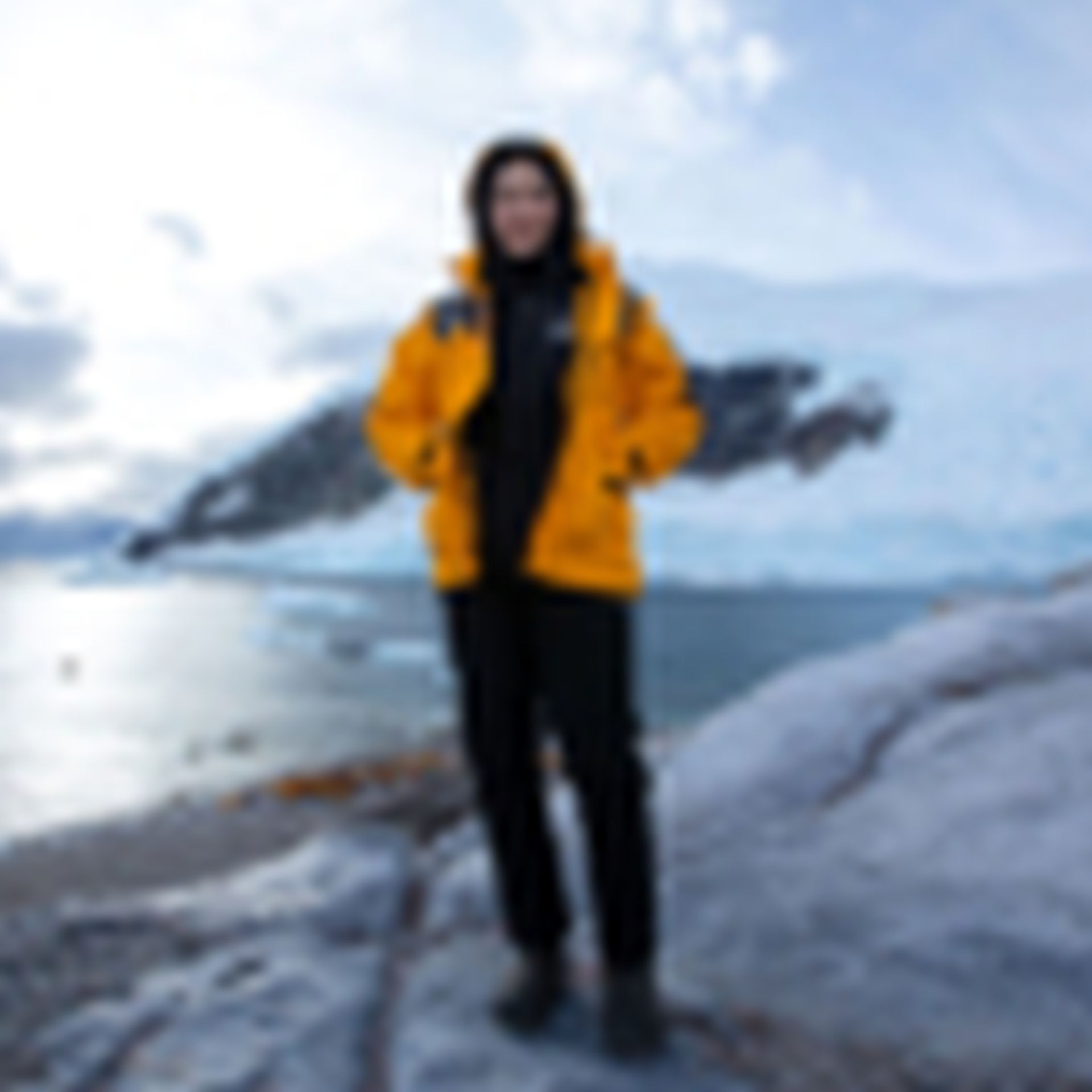A Dream Come True
Leigh Coutie/ Antarctic Heritage Trust
Sir Edmund Hillary Collegiate student Jaylee Savage introduces the haka that the 2020 Inspiring Explorers’ team did for the Quark Expedition staff to say thank you.
After a short break and some time to process her experience in Antarctica, we caught up with Inspiring Explorer Jaylee Savage to get her perspective on the expedition, and find out about the highlights of her trip, and the big challenges she faced.
About Jaylee
Jaylee is currently a senior student at Sir Edmund Hillary Collegiate, where she is studying History (her favourite subject) along with English, Mathematics, Chemistry and Biology. She is interested in studying science and learning about Zoology and Marine biology. Jaylee is interested in travelling the world, meeting new people and seeing new sights. She enjoys many sports such as football, touch, rugby league and netball. She is always up for a challenge. Her career pathway is to join the Royal New Zealand Navy.
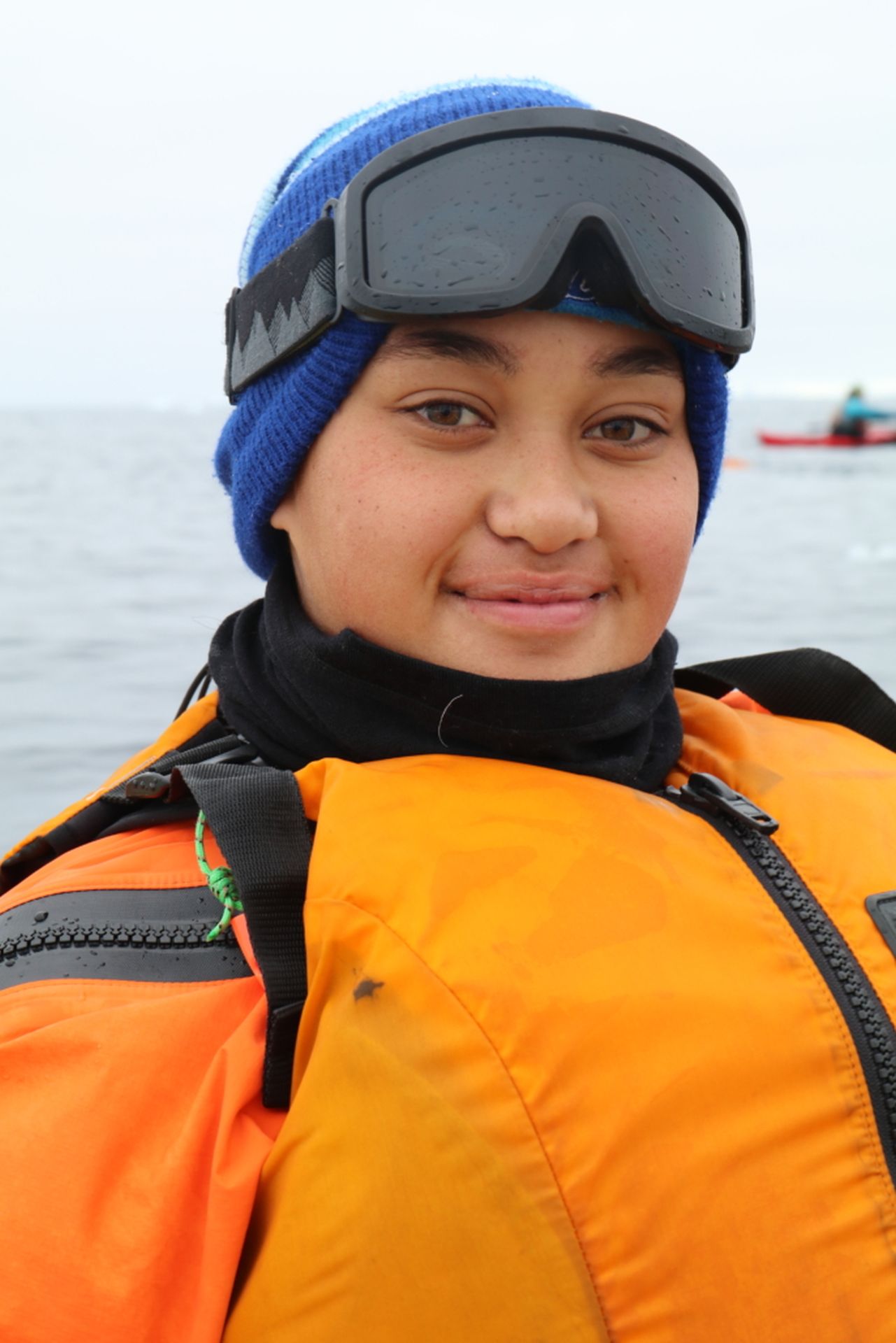 Marcus Waters/ Antarctic Heritage Trust
Marcus Waters/ Antarctic Heritage Trust Jaylee in Antarctica
What was your favourite part of the trip?
The kayaking excursions were my favourite part of the trip. I loved how unpredictable they were, as we didn’t know what each day would bring. I hadn’t seen snow before going to Antarctica, so it was breath-taking as we got to kayak while it was snowing, which was a dream come true. Seeing the beautiful wildlife and the huge sculptures of ice and mountains was just incredible. I felt so small and isolated compared to the landscape. Staying in the kayak rather than getting off on land with the rest of the team and going on a long 5-7km paddle around an island with Marcus and Mike, as well as Cam and Ryan from Quark Expeditions, was the best decision I made on the trip. I didn’t realise how far we were going, and we just could chill and glide past the unique landscape. It was stunning just to be in that moment. The freedom and the peace of mind was captivating for me and was definitely one of the highlights on the trip. It was a once in a lifetime experience to see everything we did on that paddle, which ended up being our last excursion on the expedition.
What was the most challenging part? How did you conquer this?
The kayaking was the most challenging part for me, as although I had kayaked before, I didn’t know what the weather and water would be like in Antarctica. With each kayaking excursion I became more and more confident and was surprised at how quickly I got the hang of it. One thing I didn’t get used to however was the unpredictable wildlife coming close to our kayaks, which had been my biggest fear going into the expedition. A seal came right up to Marcus and I when we were in a double canoe, and one day when I was in a single canoe, whales came right by us! I was terrified but it was also an amazing experience.
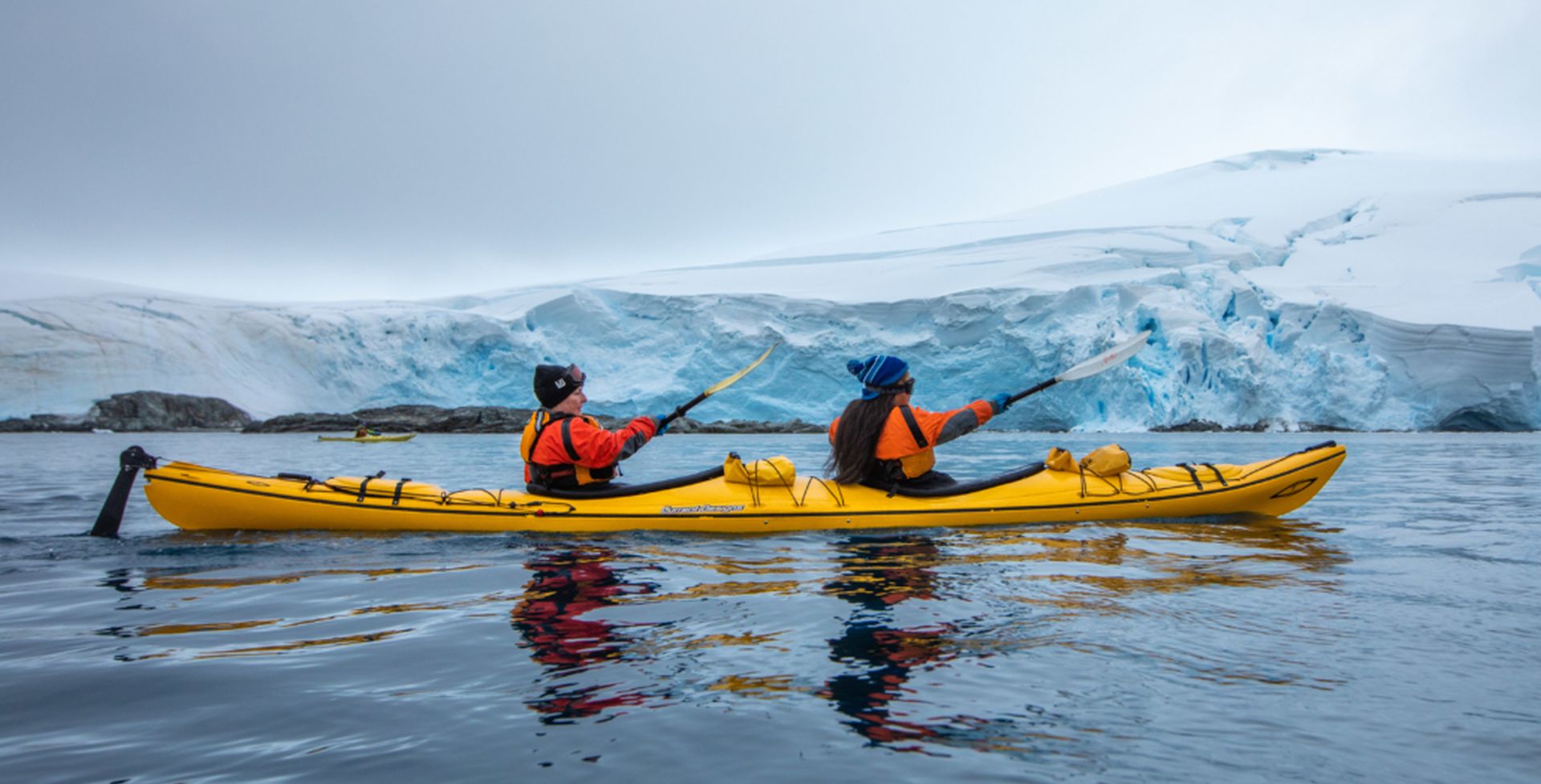 Mike Dawson/ Antarctic Heritage Trust
Mike Dawson/ Antarctic Heritage Trust Shauna and Jaylee Kayaking in Antarctica
What did you learn or discover about yourself?
I learned that I am confident talking in front of large crowds and also introducing myself to other people and having one-on-one-conversations. I felt this was a strength for me, especially on the ship where I met a lot of interesting new people, which was cool.
Which sights, sounds, feelings and experiences of Antarctica stand out as you reflect back on your experience?
The sights we saw on every excursion were unbelievable. You could sit there and look out at the scenery and it was incredible. I would walk to the back of the ship and look at where we had come from and couldn’t believe I was actually there. The interaction with wildlife was also a highlight on the trip. The penguins were so cute – how they would walk long distances with their little legs. And although I was a bit scared of the seals and whales when we were kayaking it was just breath-taking to be in that moment with them.
How did going to Antarctica make you think about the historic polar explorers? In what way did these reflections impact on your personal experience?
When I compared our expedition to theirs, I realised how totally different it must have been for the historic explorers, and how really brave and smart witted they must have been to get through all the challenges that faced them.
What was something you experienced that was different to your expectations?
I normally hate cold weather and expected the weather in Antarctica to be a lot rougher and colder than it was. I actually enjoyed the nice, cool weather, and didn’t really struggle with it at all, which was a big surprise for me.
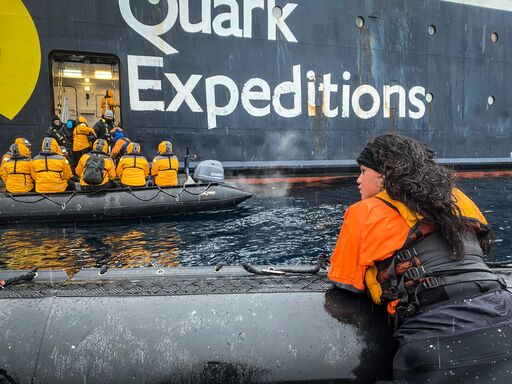 Antarctic Heritage Trust
Antarctic Heritage Trust Jaylee on Board a Zodiac
When you share your story, what will be the things you want to share most?
I definitely want to encourage other teenagers to strive and grab these opportunities when they are presented to you. I’m so grateful for the experiences I had and I am glad I was encouraged to apply. If I had the chance to go on another expedition again I would gladly do so.
What skills did you bring to the team, and how were you able to utilise these on the trip?
My leadership skills were utilised on the ship when A’aifou and I led the team haka. I had the idea for the haka as a way to say thank you to the polite, fun and cheerful crew members on board the ship. Our team was keen to do it, so we researched which haka would send the correct message and had a couple of practices each night in private, with A’aifou and I teaching the rest of the team how to do it. It was quite a mission to get them to pronounce some of the words and do the actions properly, which is why we had lots of practices. I also helped some of the team members out in their spare time – they studied really hard. I was so proud of how it all came together in the end.
Before the haka I introduced myself and who we were as a group. I then thanked all the crew members and explained the meaning behind the haka. Then the team did an amazing job of performing it – I was very proud of my students! It also lifted my spirits to get comments from the other passengers on the ship. Some of them had watched us practise and said it was inspiring to see me and A’aifou, as the babies of the group, taking charge and teaching the other team members. This definitely boosted my confidence.
Any comments about the team itself? What were the strengths of the team? Why do you think it worked well together?
Our strength was that our team came from such a diverse range of cultural backgrounds. This diversity meant we could bring a lot of different perspectives to the table. We talked about each other’s day, and our different highlights and the sights we saw, and even how our experiences related back to the communities we had grown up in, in different parts of New Zealand. It was cool to hear each other’s perspectives and stories and to learn a lot about each other.
How did you and the team deal with the disruption to your trip caused by COVID-19? Did this experience make you reflect on the challenges faced by the historic explorers? What similarities do you think there might be?
As the youngest members of the group, A’aifou and I were probably the ones who struggled most from not seeing our friends and family, and the cancellation of Polyfest due to COVID-19 also challenged us. However, the crew members and our team made the isolation lots of fun. We were lucky in that we weren’t confined on the ship and were free to move around. Our families who were stuck at home said we were the lucky ones in isolation. I enjoyed this final time together as a team. It was a pretty good experience.
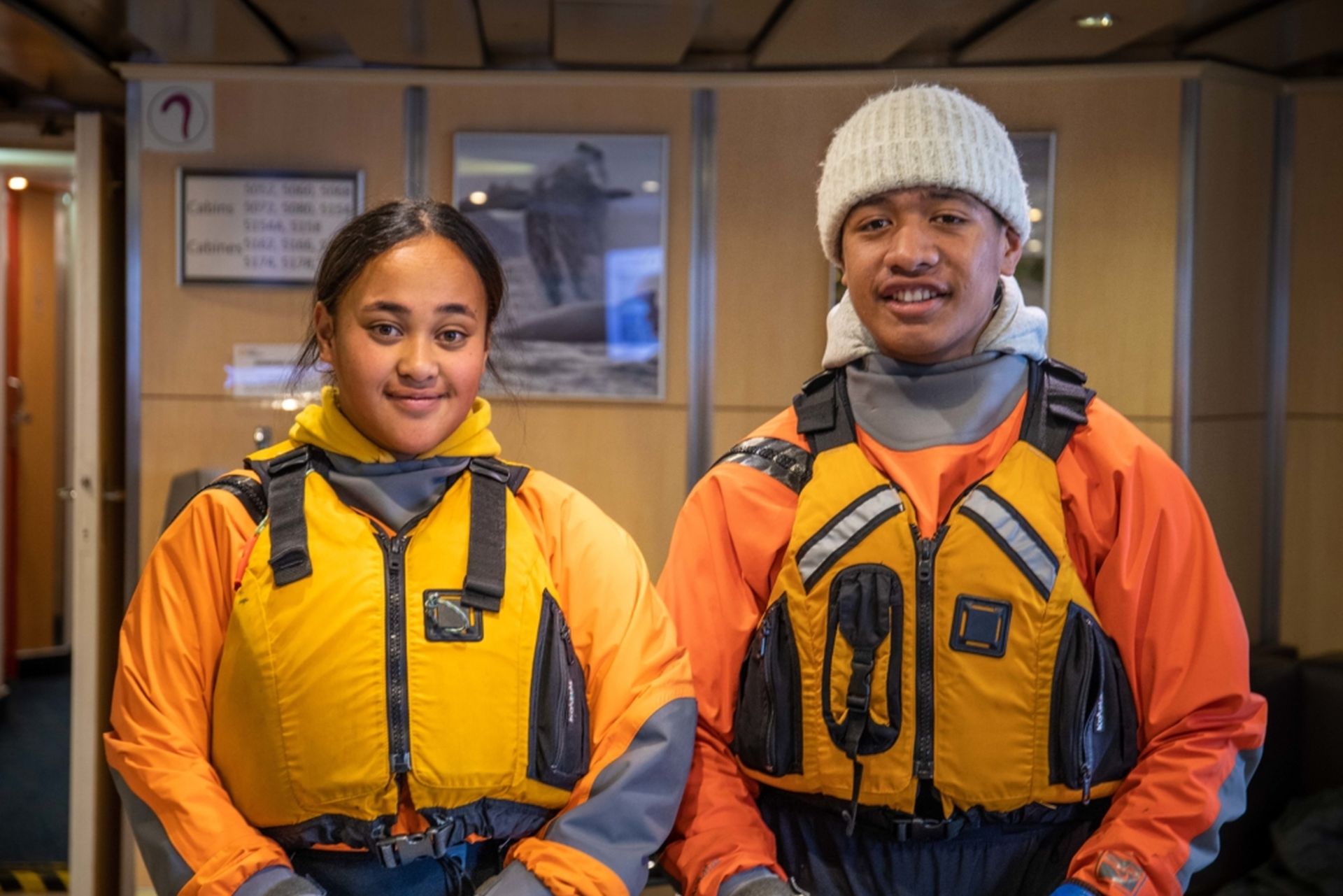 Mike Dawson/ Antarctic Heritage Trust
Mike Dawson/ Antarctic Heritage Trust Jaylee and A’aifou Ready for a Kayaking Excursion
Would you recommend others apply for future expeditions and why?
Yes! Of course. It is an amazing experience and you get the opportunity to talk to people with different backgrounds, which can even open new doors and pathways for you. Before the expedition, I knew I wanted to join the Royal New Zealand Navy, but didn’t know what pathway I wanted to take. Since talking to the Trust’s supporters, Bill and Andrew and others on the expedition, I’ve started thinking about being a translator. They said I had really good diction in English and Te Reo Māori, after helping them to pronounce kupu (words) correctly during the haka practices, and have encouraged me to keep learning languages. I already know a bit of Chinese and Korean from my friends, so I am definitely thinking seriously about this pathway.
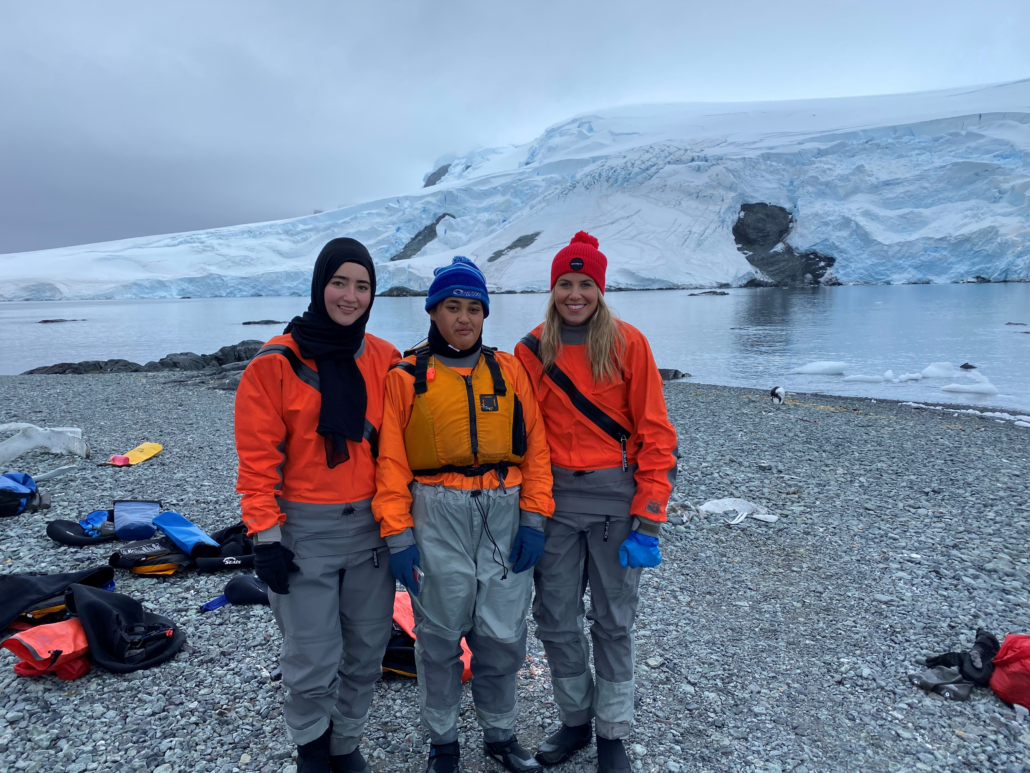 Sadra Sultani/ Antarctic Heritage Trust
Sadra Sultani/ Antarctic Heritage Trust Sadra, Jaylee and Laurette Landing in Antarctica
Click here to add your own text


